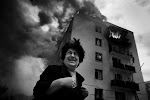Surely it’s an essential process, more honest - if you believe as I do that books have the power to change you as much as lived experience. The thing is I forget I belive this - that’s the problem. Actually it’s one of the reasons I’m writing this blog on my spare afternoon a week. To remember that books do adjust your reflection on your own life, the quality of how you meet others. As well as to an extent at least, how you develop your relationships with other people. How you formulate yourself.
Chahdortt Djavann is renowned in France for her vehement arguments in favour of a lay culture and against the effect on women of islamic fundamentalism in muslim countries, particularly Iran where she grew up. She is the author of the book “Bas les voiles” that excited a lot of attention in France, officially a lay country since the legal separation of church and state in 1905. And so my initial approach to “Comment peut-on devenir français?” ‘How can one become French?” by Djavann was more than a little clouded. Firstly in my ignorance I didn’t recognise the reference to Montesquieu’s satire on Europeans in ‘les Lettres Persanes’ written in 1721, ‘comment peut-on être persan’ is what the crowds of Parisians mutter when two Persians Rica and Uzbek who’ve been forced to flee their country for political reasons stroll through the Tuileries dressed in their traditional robes. The worst thing about ignorance is that it sends you back to the limits of your own experience for every value judgement and so reading the title brought back my own personal saturation with the emotion around assimilation in France – plus the recurrent media feasting when every now and then high school girls try to wear the ‘islamic headscarf’ to school. I know what it’s like as an immigrant - or apatride - who - on good days - lives out with pleasure (most of) the ways of another language and social culture. Assimilation in a process linked as much to time and nature as the erosive patterns of sea and wind on a coastline. Any implication of a moral imperative therein, smacks of homogenisation, no worse, eugenics - and makes me want to kick something, soon.
Both are writers for whom I felt a similar mélange of interest and tired antipathy. Without reading a single word of their work - it has to be repeated - so I must be talking about myself here. My interest - of course was because of their status as successful writers with a challenging, if not arrogant take on experience. My resistance came from the impression I got that each woman in her own way aligns herself with a certain sort of media appetite for the opinions she puts forward. .
In Reza’s case it was for what I sensed from extracts of her theatre of conventional relationships not exactly the valet hiding in the wardrobe while the mistress of the house seduces the man she doesn’t know is her brother-in –law sort of thing. But nearly. And also that she produces very much a “man’s woman”sort of writing. Not that there’s anything wrong with that. Marguerite Duras for instance does the same. Except that Duras is such a figurehead of twentieth century French fiction that before you have time to lose yourself in preconceptions based on her personality/media representation, you experience the writing first. Its music and - to pick up on my last post on Woolf ‘s ideas – and to what happened when I actually read the slim volume of Reza’s entitled in French “Une désolation” (maybe “Desolation” or “ A Grief” in English) - the plunge into writing that feels full of great endurance, openness to life, free of taboo.
The novella is the inner monologue that a successful, retired businessman relegated to the good life in the suburbs of Paris, addresses to an absent hippy son from a former marriage who has ‘done nothing’ with his life except ‘be happy’on some island in the Pacific. I would say that the choice of this framework – the tension and longing in addressing an absent child is only trace of the woman writer. The language is spare - bleached would be a better word (Reza’s reviewers like it too - blanchi in French) to describe the corrosive intelligence behind the curt phrasing and perfect ear for the ping-pong of how the mind moves back and forward presenting and hiding itself in conversation. As I read it I remembered a tv interview with Reza in which she talked at length about her relationship with her father. She got all her juice from him I remember her saying. This understanding of theirs must have given her that insider’s position you can’t fake with the septugenarian’s voice in this book, a whale of an ego, full of angry, ironic grief for the ‘times of destructive passion’ in his own life. He is nolonger in love with his present wife because she has‘chosen happiness’ and ‘effort’ and positivity every morning over her French toast. His days are warmed by his faithful affection for a lifelong friend who sits at a window contemplating the seasonal changes in a tree in the middle of the Parisian traffic. He remembers the sheer lack of choice in his obsessive desire for a married woman and their futureless affair conducted in doorways and hotel rooms. The nearest he gets to grief in the altruistic sense of the word is in mourning the death of a self-made business friend who used all his energy to perfect his flat in the middle of Paris whilst wondering all the time ‘what next’
It’s the tone particular to French – the language and people that I hear everyday, in myself too - a sort of deliberate shrugged -on philosophic mockery. The other side of the coin is a relish of the here and now, la bonne chère they say, a sort of pagan revelry in food and flesh. At its worst a Gallic parochial xenophobia and in its flower as in Reza’s narrator – who knows the world outside France and has lost the love of his son, it provides a keen, very funny reflection on the saccharine compromise of any ‘life-solution’ It’s charismatic in its air of full-on honesty and that is maybe for the first book – for now that I know of her admiration for Sarkozy - not the person but what he stands for - I have a feeling that every book of Reza’s will keep up this unvaried punchy macho attitude to despair. Fun - if you don’t mind spending all your time around strong egos half in love with themselves and their own domestic tragedies. There is that seductive tone of intelligent Woody Allen-esque bafflement too, the one that you like to give yourself up to its making you laugh over and over again at the pitiful misery of life’s illusions. Reza’s protagonist is Jewish too, though cutting off from friends who buy a retirement home in Israel is part of his refusal of ‘the solution’ of his rancid pity for any of those “poor souls” who hope for ‘some accomplishment’, who take up a political stance to explain their own degradation, “optimistes en tutu!”
“Everyday the world shrinks me a little bit more and today the world shrinks in me. That’s the way it goes. Little by little death gains ground. You get used to it. You get used to death. You’re not as upset as all that to join in the rhythm of the universe.”
Reza’s writing is a joy in particular delight for an outsider to the French language like me, with its ear for ironic self-portraiture artfully baked in, as it were to every pause and word. It creates a sense of affection for the character that I don’t feel so much in English. I wonder if that’s because I’m so much inside the language or if it’s that I haven’t lived in an English speaking country for so long.
Subscribe to:
Post Comments (Atom)



















































Ce qui est pertinent (relevant) dans la vie, c'est l'échange, comme tu le fais avec ton blog en nous dévoilant tes réflexions sur certaines lectures, mais aussi en nous proposant de magnifiques oeuvres que je découvre. J'aime aussi me pauser sur une de tes images.
ReplyDeleteand 'exchanging'ideas over books by formulating your own ideas for someone else means the book works at a denser, more conscious level - which in turn makes reading even more interesting than before...
ReplyDelete